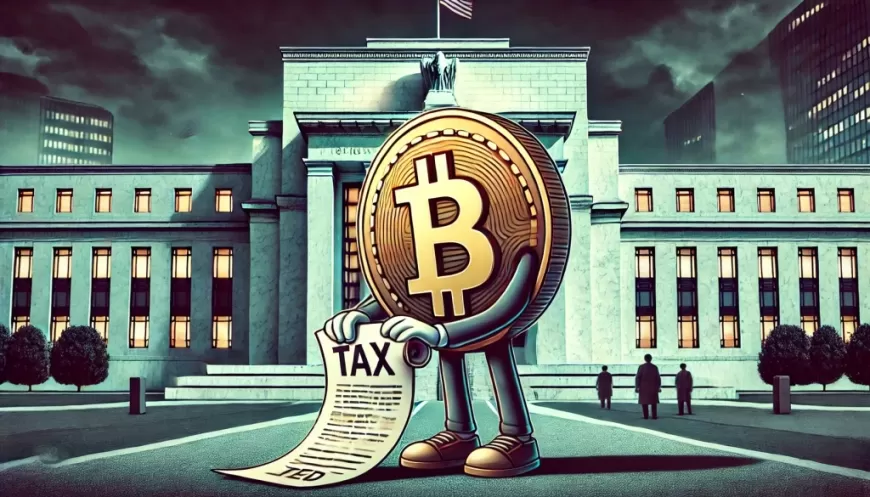Federal Reserve Suggests Bitcoin Ban or Tax to Curb Economic Risks
The Minneapolis Fed calls for a high tax or ban on Bitcoin, citing economic stability concerns. Could new regulations reshape the future of digital finance?

A recent study by the Federal Reserve Bank of Minneapolis has placed Bitcoin in the spotlight, warning that the decentralized currency could disrupt the U.S. government’s fiscal policies. Federal researchers propose two bold strategies to mitigate these risks: imposing a high tax on Bitcoin or banning it outright. This proposal underscores the mounting tension between decentralized digital assets and centralized financial control.
Bitcoin’s Challenge to Government Fiscal Policy
The Minneapolis Fed study argues that Bitcoin’s structure, which allows it to operate outside traditional banking and government systems, creates a unique challenge for fiscal stability. Unlike fiat currency, which the government can regulate to manage inflation, interest rates, and debt, Bitcoin functions independently. The report emphasizes that this independence could destabilize critical financial policies, particularly when the government maintains a “permanent primary deficit,” a scenario where spending consistently surpasses revenue.
With the U.S. primary deficit at $1.8 trillion and the national debt hitting $35.7 trillion, the researchers argue that Bitcoin’s decentralized nature interferes with the government’s ability to control fiscal policy. By competing with government-issued securities, Bitcoin threatens the delicate financial mechanisms that support debt management and economic growth.
The Wealth Inequality Dilemma
The study also points to Bitcoin’s impact on wealth distribution, raising concerns that it may deepen economic inequality. Because early adopters and large holders control a significant portion of the Bitcoin supply, wealth within the cryptocurrency market remains concentrated. According to the report, Bitcoin’s Gini coefficient—a measure of income or wealth inequality—reveals a stark divide that could worsen existing economic disparities.
The European Central Bank has echoed similar concerns, suggesting that Bitcoin’s volatility and speculative nature favor early investors over new entrants, exacerbating economic inequality and creating additional challenges for monetary policy. Central banks worry that if left unregulated, Bitcoin may continue to fuel a wealth gap that conflicts with efforts to promote financial equality.
Impact of a Bitcoin Ban or Heavy Tax on the Cryptocurrency Market
A heavy tax or outright ban on Bitcoin in the U.S. would mark one of the most significant regulatory moves in the history of digital finance, with far-reaching implications for the global cryptocurrency market. If implemented, a high tax could dampen Bitcoin’s appeal as an investment and store of value, especially for those seeking a hedge against inflation. A ban could push Bitcoin transactions into less-regulated or gray markets, potentially creating a parallel digital economy that evades regulatory oversight.
Such measures might also influence other countries' approaches to cryptocurrency regulation. If the U.S. curtails Bitcoin’s influence on its fiscal policy, other nations facing similar issues might follow suit, slowing down cryptocurrency adoption worldwide. For advocates of blockchain technology, these proposed restrictions pose a significant obstacle, potentially forcing the industry to adapt to a more controlled environment.
A Crossroads for Digital Finance and Government Policy
The Minneapolis Fed’s recommendations signal a turning point for governments considering how to handle the influence of decentralized assets. Bitcoin’s promise of financial autonomy and resistance to inflation has attracted a vast user base and investor interest. Yet, for policymakers, this very independence threatens economic stability by undermining central control over fiscal policy.
The Fed study suggests that governments might need to act swiftly to establish clear regulations. Whether through heavy taxation or an outright ban, these policies would reshape the financial landscape, affecting investors, institutions, and the entire market for digital assets. The cryptocurrency community, which has grown alongside Bitcoin’s rise, may soon face more significant challenges as the push for regulatory oversight intensifies.
A Pivotal Moment for the Future of Bitcoin
As Bitcoin continues to test the boundaries of the financial system, governments worldwide may need to reevaluate their approach to decentralized currencies. This latest study by the Minneapolis Fed highlights the potential for decentralized assets like Bitcoin to interfere with traditional fiscal structures. The response from policymakers, whether restrictive or adaptive, will set the tone for digital finance in the coming years.
The decision could also determine whether Bitcoin remains a viable investment or faces a more regulated path that limits its economic influence. The world is watching as Bitcoin confronts what may be its most significant regulatory challenge yet—one that could ultimately decide its role in the future of global finance.
Also Read: 20 Million in Cryptocurrency Stolen from US Government Wallets Raises Security Concerns































































